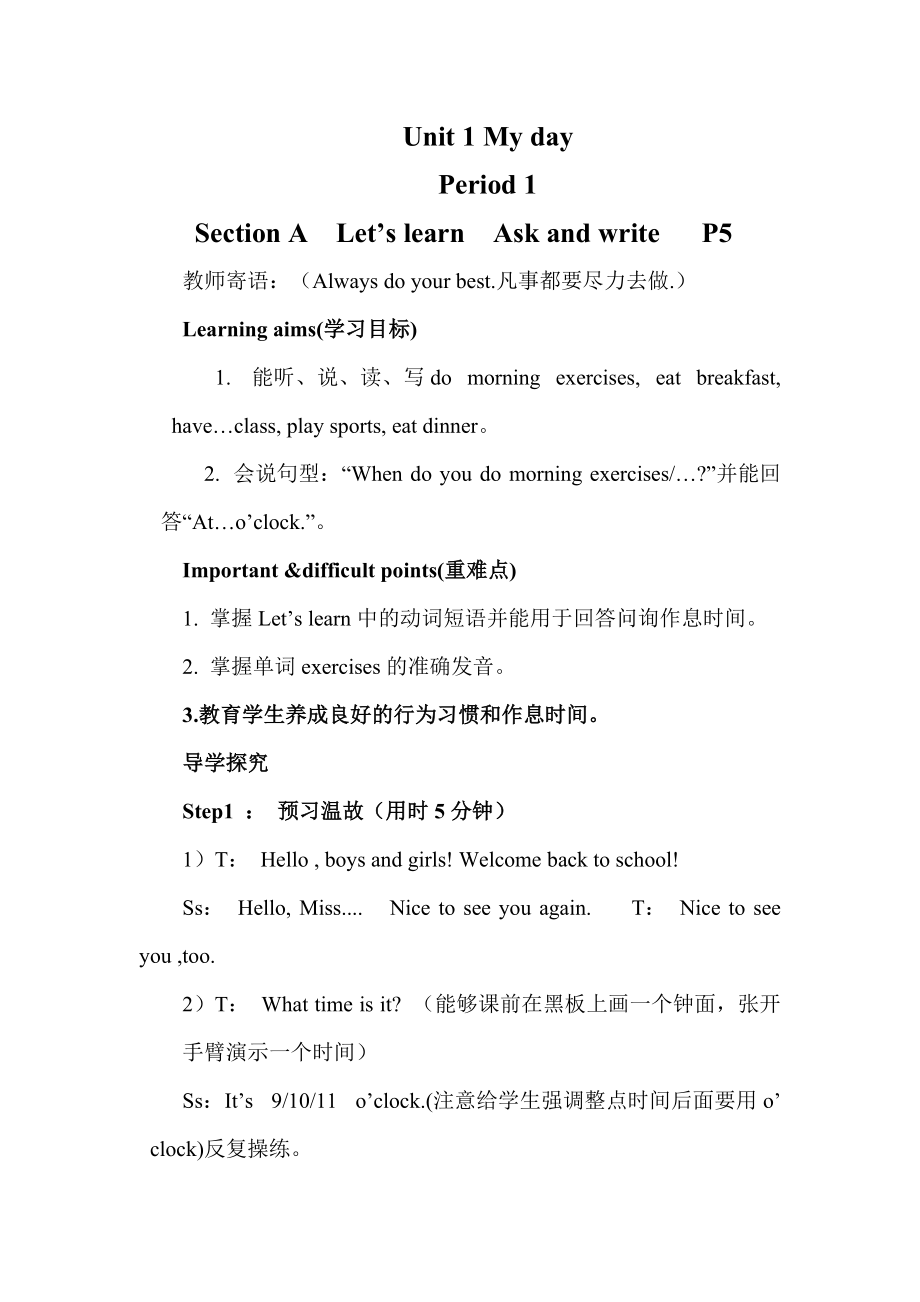《五年級(jí)下冊(cè)Unit1 My Day教學(xué)設(shè)計(jì)》由會(huì)員分享��,可在線閱讀��,更多相關(guān)《五年級(jí)下冊(cè)Unit1 My Day教學(xué)設(shè)計(jì)(3頁(yè)珍藏版)》請(qǐng)?jiān)谘b配圖網(wǎng)上搜索��。
1��、
Unit 1 My day
Period 1
Section A Let’s learn Ask and write P5
教師寄語(yǔ):(Always do your best.凡事都要盡力去做.)
Learning aims(學(xué)習(xí)目標(biāo))
1. 能聽(tīng)��、說(shuō)��、讀��、寫do morning exercises, eat breakfast, have…class, play sports, eat dinner��。
2. 會(huì)說(shuō)句型:“When do you do morning exercises/…?”并能回答“At…o’clock.”��。
Important &difficul
2��、t points(重難點(diǎn))
1. 掌握Let’s learn中的動(dòng)詞短語(yǔ)并能用于回答問(wèn)詢作息時(shí)間��。
2. 掌握單詞exercises的準(zhǔn)確發(fā)音��。
3.教育學(xué)生養(yǎng)成良好的行為習(xí)慣和作息時(shí)間��。
導(dǎo)學(xué)探究
Step1 : 預(yù)習(xí)溫故(用時(shí)5分鐘)
1)T: Hello , boys and girls! Welcome back to school!
Ss: Hello, Miss.... Nice to see you again. T: Nice to see you ,too.
2)T: What time is it? (能夠課前在黑板上畫一個(gè)鐘面��,張開(kāi)手
3��、臂演示一個(gè)時(shí)間)
Ss:It’s 9/10/11 o’clock.(注意給學(xué)生強(qiáng)調(diào)整點(diǎn)時(shí)間后面要用o’clock)反復(fù)操練��。
3)Go over these phrases : wash my clothes, watch TV, do homework, read books, play football.
Let’s do homework/read books/play football/… .
I often wash my clothes/watch TV/do homework/ read books/… .
Step 2. 新課內(nèi)容展示(用時(shí)20分鐘)��。
4��、
1. Use the cards to learn new phrases.
T: do morning exercises, do morning exercises, follow me to read.
用同樣的方式教讀其他詞組:eat breakfast, have…class, play sports, eat dinne(重點(diǎn)強(qiáng)調(diào)exercises��、breakfast的發(fā)音)��。
2. T: do morning exercises, do morning exercises, Let’s/I often do morning exercises.
T: eat din
5��、ner, eat dinner Let’s/ I often eat dinner.
3. Read these sentences.
T: I can swim/play football/play sports…..
T: Can you do morning exercises/…? Ss: Yes, I can./No, I can’t.
T: When do you do morning exercises /play football/play sports?”
Ss: At… o’clock.(跟學(xué)生強(qiáng)調(diào)整點(diǎn)前要用介詞at) 反復(fù)操練。
4.
6��、學(xué)生聽(tīng)錄音��,分角色讀Let’s learn ��。
5. Pedor有著合理的學(xué)習(xí)和作息時(shí)間��,學(xué)生養(yǎng)成合理的生活習(xí)慣非常重要��。良好的行為習(xí)慣和作息時(shí)間會(huì)讓你們有序地生活和學(xué)習(xí)��。
Step 3. 合作交流��,師生共建(用時(shí)8分鐘)
Role- play:
1) Answers the questions.
T: What time is it? Ss: It’s six/nine o’clock.
T: I get up at six o’clock. When do you get up/go to school?
Ss: I get up
7��、at 7.a.m/ 7:30.
2) Ask and write.
教師引導(dǎo)學(xué)生完成填空��,并分小組運(yùn)用句型進(jìn)行對(duì)話練習(xí):
T: When do you get up/do morning exercises? Ss: I get up at….a.m/p.m.
反思:在今后的每一節(jié)課都要靈活運(yùn)用所學(xué)句型��,請(qǐng)學(xué)生造句��,要具有培養(yǎng)學(xué)生的創(chuàng)新意識(shí)��。
Step4.布置作業(yè)http://w ww. xk b1. com
1.書寫并背誦四會(huì)詞組��。2.讀背Let’s learn的對(duì)話��。
板書標(biāo)題 Unit 1 My day
板書內(nèi)容設(shè)計(jì):
do morning exercises eat breakfast have…class play sports eat dinner
When do you do morning exercises/eat breakfast/…? At…o’clock.
When do you get up/…? I get up at….a.m/ p.m.
 五年級(jí)下冊(cè)Unit1 My Day教學(xué)設(shè)計(jì)
五年級(jí)下冊(cè)Unit1 My Day教學(xué)設(shè)計(jì)

